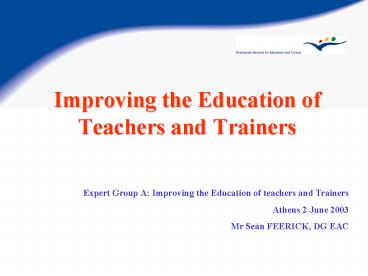Improving the Education of Teachers and Trainers PowerPoint PPT Presentation
1 / 29
Title: Improving the Education of Teachers and Trainers
1
- Improving the Education of Teachers and Trainers
Expert Group A Improving the Education of
teachers and Trainers Athens 2 June 2003 Mr Seán
FEERICK, DG EAC
2
- Section 1
- Framework of the Objectives Process
- Section 2
- Work of the Expert Group A - improving the
education of teachers and trainers
3
Article 149 (ex Article 126)
- The Community shall contribute to the development
of quality education by encouraging co-operation
between Member States and, if necessary, by
supporting and supplementing their action, while
fully respecting the responsibility of the Member
States for the content of teaching and the
organisation of education systems and their
cultural and linguistic diversity
4
Bologna ProcessCopenhagen
ProcessObjectives Process
5
- The objectives process and the open method of
- co-ordination
6
Lisbon, March 2000
- Strategic goal for the EU to 2010
- to become the most competitive and dynamic
knowledge-based economy in the world, - capable of sustainable economic growth
- with more and better jobs
- and greater social cohesion
7
HOW?
- The Education Council
- to undertake a general reflection on the concrete
future objectives of education systems, - focusing on common concerns and priorities,
- while respecting national diversity
8
The open method ofco-ordination
- A co-ordinated strategy
- Common objectives
- Common instruments
9
The common tools
- Indicators and benchmarks
- Exchange of good practice
- Peer reviews
10
Barcelona, March 2002
- Detailed work programme on the follow-up of the
objectives of Education and Training Systems in
Europe
11
The Detailed Work Programme
- 3 Strategic objectives
- 13 Objectives
- 33 Indicative indicators
12
Strategic Objective 1
- Improving the quality and effectiveness of
education and training systems in the EU
13
Strategic Objective 1
- 1.1 Improving education and training for
teachers and trainers - 1.2 Developing skills for the knowledge society
- 1.3 Ensuring access to ICT for everyone
- 1.4 Increasing recruitment to scientific and
technical studies - 1.5 Making the best use of resources
14
Strategic Objective 2
- Facilitating the access of all to education and
training systems
15
Strategic Objective 2
- 2.1 Open learning environment
- 2.2 Making learning more attractive
- 2.3 Supporting active citizenship, equal
opportunities and social cohesion
16
Strategic Objective 3
- Opening up education and training systems to the
wider world
17
Strategic Objective 3
- 3.1 Strengthening the links with working life
and research in society at large - 3.2 Developing the spirit of enterprise
- 3.3 Improving foreign language learning
- 3.4 Increasing mobility and exchange
- 3.5 Strengthening the European co-operation
18
Eight Blocks of work
- Teacher/trainer education
- Basic skills/foreign language teaching/entrepreneu
rship - ICT in education and training
- Increasing participation in maths and science
- Best use of resources
19
Eight Blocks of work
- Mobility and European co-operation
- Open learning, active citizenship, inclusion
- Making learning more attractive, links with
working life and society
20
Group A Improving the education of teachers and
trainers
- 4 Key Issues
- 1. Identifying the skills teachers and trainers
need given their changing roles in society - 2. Supporting teachers and trainers as they
respond to the challenges of the knowledge
society - 3. Securing sufficient entry levels
- 4. Attracting people into the profession from
other areas of professional experience
21
Learning process competencies
- how teachers are equipped to deal with issues
such as diversity of intake, and the environment
in which teaching takes place
22
- (a) Dealing with social, cultural and ethnic
diversity - (b) Organizing learning environments
- (c) Integrating ICT
- (d) Working in teams
- (e) Working in school curriculum and organisation
development and evaluation - (f) Collaborating with parents and other social
partners - (g) Acting in an investigative or problem-solving
way - (h) Steering and promoting their own professional
development
23
Learning outcome competencies
- how teachers/trainers are equipped to ensure that
pupils/trainees acquire skills of citizenship,
develop appropriate competencies during their
education/training
24
- (i) Contributing to citizenship education of
pupils and trainees - (j) Promoting the development of competencies of
pupils for the knowledge society - (k) Linking the development of new curriculum
competencies with subject learning
25
Competencies seen as relating to
- 1) Continuum of the teaching/training profession
- 2) Dialogue between the school and society
26
Focus on policy practice relating to the
competenciesIssue of policy development and
implementation
27
Study visits
- Deepen knowledge and understanding
- Identify messages of interest to countries and
European level
28
Next steps
- Report of the Expert Group
- What has been accomplished
- What needs to be done in the medium term
29
Interim Report at Education Council
(Autumn)Presentation of update on process to
European Council (Spring 2004)

